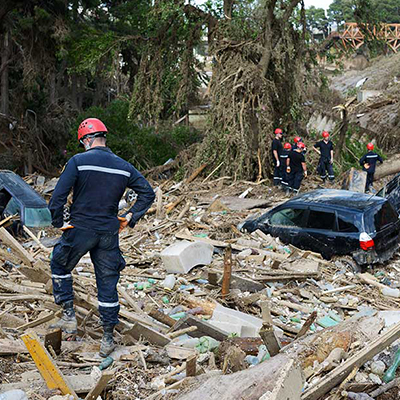A mass fatality event occurs when the number of dead overwhelms the local healthcare system and morgue facilities. Whether the event is natural or man-made, a jurisdiction’s disaster preparedness plans should involve portable mobile morgues and refrigerated trailers as part of a proper and comprehensive disaster response, whatever the death toll may be.
A portable mobile morgue unit is a deployable mortuary system with the capabilities of pathology, full body x-ray, and victim identification. It’s also equipped for postmortem care such as body processing, preparation, and disposition. A portable mobile morgue can be set up near to a disaster site in an area such as a warehouse, gymnasium, or parking lot.
A mobile morgue trailer is a trailer specially designed and built for storage of cadavers. The trailer will have stainless steel body trays and a racking system for proper storage of the deceased, as well as a refrigeration unit. Bodies can remain there in cold storage until family members can arrange for transport to a funeral home. Refrigerated trailers are necessary when local morgue space has become completely filled. They can be parked in a hospital parking lot, outside of the local morgue, or near to a disaster site.
Whether a mobile morgue trailer or a portable mobile morgue, preparedness is key no matter the nature of the incident.
Additional Facilities During a Natural Disaster
Natural disasters not only have the capability of causing significant fatalities, but can also destroy (or through loss of power and water, render unusable) local healthcare and morgue facilities. In these sorts of situations, versatility and mobility are key. A portable morgue unit is the ideal solution when rapid, independent support is required for efficient disaster response.
Refrigerated trailers can be used to keep bodies cool and prevent decomposition in an area with no electricity until they can be retrieved by their families for burial. Without these resources available, an already bad situation rapidly becomes a humanitarian crisis. Dead bodies can pile up in the street and otherwise contribute to the spread of disease. (This was the case in the aftermath of the 2004 Asian earthquake and tsunami that caused the deaths of over 200,000 people. Many of the countries affected by that disaster were poor, tropical countries with no local or government mass fatality contingencies.) Within 48 hours, decomposition can make facial identification impossible.
In the case of the 2004 earthquake and tsunami, authorities had to resort to dry ice storage or temporary internment of the dead in shallow graves. Collection of bodies was piecemeal; thousands of bodies were never identified. Much of the cleanup was done by local citizens rather than government institutions. This was, of course, an extreme case and an extraordinary situation. But had those governments been more prepared with disaster plans, then collection of the dead may have been easier and less haphazard.
Thailand was the only country that was able to organize refrigerated trailers, and it still took the Thai government two weeks to obtain one hundred trailers that provided storage space for about 3,600 bodies. However, in Sri Lanka, many dead bodies were taken to local hospitals, which had the unintended effect of delaying treatment to injured survivors. In some parts of Indonesia that had large Muslim populations, bodies were buried within 24 hours in accordance with Islamic burial traditions, whether they had been identified or not.
This would have been an ideal scenario for use of refrigerated trailers; not only to keep the hospital running smoothly, but to also to prevent the smell of decay in the tropical heat from spreading through the entire facility. Refrigerated trailers and portable morgue units are constructed with mobility at the forefront, so they can be quickly parked or set up and then torn down to be relocated to a new area if necessary.
Extra Storage during the Coronavirus Pandemic
As COVID-19 deaths began to increase all over the United States, hard-hit places like New York City had to turn to refrigerated trailers to store the large number of bodies. The coronavirus pandemic was different from other disasters such as a flood or terrorist attack in the way that it unfolded over a longer span of time. Most mass fatality incidents occur over a few days at most, with the clean up and recovery taking the majority of the time and effort. However, the pandemic is a slow-moving disaster that develops peaks and valleys as the virus surges and wanes in different parts of the country. At any given time some places could be experiencing only a minor uptick in deaths whereas other locations could be having their resources severely tested.
In spring of 2020 when the death toll was starting to rise to surge levels in the United States, many unprepared cities and jurisdictions had to resort to refrigerated trailers that were normally used for transporting food. These trailers are obviously not built for the purpose of storing cadavers, and lacked the basics such as lighting, independent power, and racks and trays. Ultimately, they had to fulfill the role of a mobile morgue trailer until the proper trailers could be secured.
It wasn’t just urban centers that required refrigerated trailers to augment their morgue space. Smaller rural communities also saw a benefit with the addition of portable morgues and refrigerated trailers during the pandemic as facilities and personnel were overwhelmed with the number of deceased.
Disease Reduction in Disaster Response
Hygiene suffers after a major natural disaster, regardless if the occurrence is in the first world or the developing world. First world countries have an advantage in resources, which makes disaster cleanup a smoother process. Poor countries lacking in resources and human capital always feel the effects harder and for a longer period of time following the disaster. They frequently have to rely on outside help from nearby first-world countries or the United Nations.
By utilizing assets such as portable morgue units and refrigerated trailers, those responding to the disaster can greatly reduce their exposure to disease. With the deceased separated from survivors, the risk of disease transmission to the local population is also reduced.
Housing Decedents with Care and Respect
Even in the event of a mass fatality event, there can’t be an oversight in respectful treatment of the deceased victims. Unfortunately, this has a tendency to happen during natural disasters as responding agencies focus primarily on the living victims first. Survivors have the right to see their deceased relatives treated with care and dignity, but the added strain only compounds the distress of a community that is already suffering. To execute the respectful housing of decedents requires an understanding of disaster guidelines and support from every level of government, from central down to local.
Regional planning between governments can be of great benefit to developing countries, who can strengthen their disaster response capability by pooling their limited resources together. They can share personnel, equipment, and forensic knowledge to enhance their response measures without having to rely on developed nations. Countries that share ethnic or cultural similarities would find this especially useful to implement, having knowledge of each others’ traditions and taboos.
Disasters and mass fatality events, while difficult (or impossible) to predict, can be at least planned for sufficiently so as to mitigate their lingering effects. Portable morgue units and refrigerated trailers are the perfect solution to shorthanded personnel and under-equipped facilities. With their ability to be quickly deployed at almost any location, they can relieve the tremendous burden that a mass fatality incident imposes onto a given jurisdiction.
Full Disaster Preparation
Penn Care is able to design and build a custom-made portable morgue unit according to your jurisdiction or agency’s specifications and price range. All you need to do is let us know about your institution’s requirements!
Our refrigerated trailers come in a variety of sizes to fit your needs: smaller trailers range from seventeen to thirty one feet, and our large trailers are fifty three feet long with the capacity to hold up to 90 remains. Our trailers have a life expectancy of more than twenty years and feature a one year warranty. The trailer interiors are completely sealed to allow for washing and decontamination.
Penn Care also supplies generators, mobile cadaver lifts, and aluminum rack systems to complement your mobile mortuary solution. Disasters are difficult to plan for, so plan to be as prepared as you possibly can. Contact Penn Care today to make sure you’re ready!




Comments are closed.